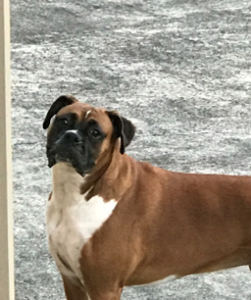 With the popularity of brachycephalic breeds on the rise we thought it timely to talk about the above Brachycephalic Airway Syndrome (BAS) condition.
With the popularity of brachycephalic breeds on the rise we thought it timely to talk about the above Brachycephalic Airway Syndrome (BAS) condition.
Dogs that have a shortened nose and skull compared to other dog breeds are referred to as brachycephalic breeds. These include English and French Bulldogs, Boxers, Pekingese, Pugs and Boston Terriers. This face shape can lead to an increase in breathing problems.
Some of the anatomical abnormalities include:
- Narrow or pinched nostrils
- Elongated soft palate
- Everted laryngeal saccules
- Narrow windpipe
- Laryngeal collapse
The signs of brachycephalic airway syndrome may include:
Mild – snoring, noisy breathing, gagging or retching while swallowing
Moderate – excessive, loud panting and exercise intolerance
Severe – blue tinged tongue or gums, fainting or hyperthermia (overheating).
Many brachycephalic dogs do not realise their limitations and will continue to push themselves on walks or during play. This can turn a mild or moderate respiratory problem into an emergency situation, especially in summer when it is hot and humid, during stress or excitement or in more obese dogs.
4 very important lifestyle changes that can help:
- Manage their body temperature – don’t let them overheat, keep them in a car or leave them outside on hot days.
- Maintain a healthy body weight erring on the lean side
- Avoid strenuous exercise and don’t exercise them on hot days, in summer only walk them at twilight.
- Training can be important – avoid over excitement, leash pulling, persistent barking and train them to sit quietly when guests arrive.
Surgery may be recommended to stop or delay secondary changes caused by the chronic irritation of the narrowed airways that could worsen the condition. Younger pets that have surgery have a good prognosis.
If you notice any of the following signs in your pet contact a vet immediately.
- Increased noisy breathing
- Struggling to breathe
- Difficulty swallowing
- Excessive snoring but cannot sleep
- Blue gums or tongue
- Fainting
If you have any further concerns please don’t hesitate to contact the friendly staff here at the Cronulla Vet Clinic on 9527 2604.
